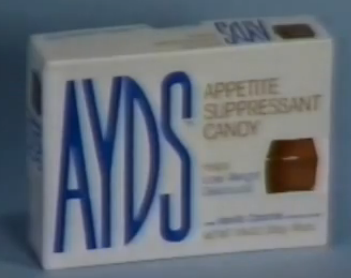In the 1930’s and 1940’s, the Carlay Company in Chicago, Illinois developed a candy coated dietary suppressant called Ayds. It sold the business to Campana Corporation. Campana was then sold to Dow Chemical. In the 1960’s, Dow sold the business to Purex and hired legendary Hollywood stars and other celebrities to endorse the product. In 1981, Purex exited the business by selling it to a firm called Jeffrey Martin, Inc.
[mainbodyad]Throughout the 1970’s and early 1980’s, Ayds was very successful, generating a lot of cash for Campana. Things were still fine when the business was sold to Jeffrey Martin, Inc. However, between 1982 and 1987, a virus named HIV reached critical mass and resulted in a condition scientists dubbed AIDs, an acronym for Acquired Immunodeficiency Syndrome . It was pronounced exactly the same way as Ayds. Overnight, television newscasts and newspapers showed pictures of healthy young people suddenly dying in a matter of weeks or months after becoming sick and wasting away to skeletons, with headlines screaming “AIDs”. Blood transfusions caused children get infected and pass away. Mothers infected infants. The entire African continent began to be gripped by the virus, destroying generations.
Sales of Ayds maintained their steady pace for awhile, and in 1987 the Dep Corporation bought Jeffrey Martin, Inc.
One year later, in 1988, Ayds revenue had collapsed by 50%. The brand equity was utterly destroyed, beyond the hope of any redemption. For a moment, there was a glimmer of a turnaround when management announced it was going to rebrand and relaunch the product. The new name was chosen. The executives announced the new, reintroduced product would be called – get ready for this – “Diet Ayds”.
I’m not kidding. I wish I were. Apparently, the brilliant folks in the corporate wing thought that was sufficiently different to get people to overcome their now-conditioned response to hearing the word “AIDs” and seeing people waste away to death almost instantaneously. Who, after all, wouldn’t want to go on the “Ayds diet plan”? Doesn’t it sound appetizing to you? It is hard to believe, but the marketing team behind Ayds seemingly didn’t understand what they were up against: That people were trying to avoid AIDs at all cost, which meant they were not going to pick up Ayds in the grocery store.
The advertising was clueless and the owners too paralyzed by fear of change to take decisive action. The original claims, which had long since been refuted, were that you could, “Lose 10 pounds in 5 days with Ayds”, taking on an irony that is only clear in retrospect. Look at this commercial that aired the year I was born.
Here is one more marketing example … get back into a size six with Ayds. Question: Why take diet pills when you can enjoy Ayds?
When a situation like this arises, and there is no way the brand name can be salvaged, you move quickly. You don’t sit around and hope it’s going to work out for the best. A perfectly good business was wiped off the face of the planet because the people who owned it didn’t understand the mere association mental model.
This is why mental models matter. If you had studied them and were a controlling shareholder or manager, you would have had a much better chance at seeing what a nightmare this was long before the company realized it. It could have saved millions of dollars and a lot of jobs.



